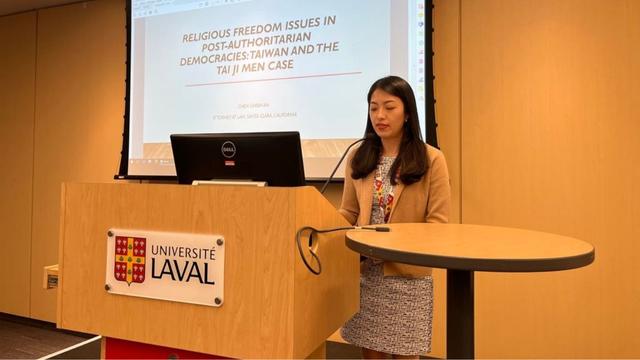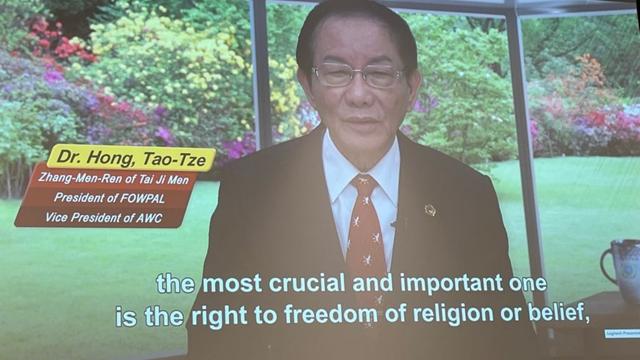Scholars and dizi presented papers on different angles of the 25-year-old case at Quebec City’s Université Laval
by Massimo Introvigne

The annual conference of CESNUR, the Center for Studies on New Religions, has been since its first edition in 1988 the most important gathering of international scholars of new religious and spiritual movements. It was held every year since 1988, except in 2020 and 2021 due to the COVID-19 pandemic. On June 16–18, 2022, CESNUR was finally able to have its yearly event at Quebec City’s Université Laval, in Canada.
The first plenary session concluded with the world premiere of the movie “Who Stole Their Youth? The Tai Ji Men Case in Taiwan.” It is the second movie on Tai Ji Men I scripted and directed, and it answers through a visual reconstruction three questions: What is Tai Ji Men? What is the Tai Ji Men case? Why the protests? It created a considerable interest among those scholars who were not familiar yet with the Tai Ji Men case. Several others had already participated in webinars about the case, and found the film a useful summary.

A separate session was entirely devoted to the Tai Ji Men case, and was chaired by Eric Roux, President of the European Interreligious Forum for Religious Freedom. Roux also introduced two videos, one with greetings to participants of the CESNUR conference by Dr. Hong Tao-Tze, the Shifu (Grand Master) of Tai Ji Men, who insisted on conscience as a key principle both for human rights advocacy and scholarly research, and one featuring cultural performances by Tai Ji Men dizi (disciples) in two recent international events in Sweden and Turkey.
I presented the new website taijimencase.org and mentioned as an example of its usefulness for scholars and activists the detailed chronology it offers of the Tai Ji Men case.

Roux then introduced papers by four Tai Ji Men dizi. Lily Chen, an English language teacher and translator from Los Angeles, presented a classic story from “The Records of the Grand Historian,” a historical and literary masterpiece about ancient China, written by Sima Qian (145–86 BCE) who finished it around 94 BCE. In 207 BCE, a corrupt Chinese Prime Minister called Zhao Gao declared that a stag he presented to the Second Emperor of the Qin dynasty was indeed a horse, and had the courtiers who refused to call the stag a horse executed. For Zhao Gao, this was an arrogant affirmation of his power. In the Chinese tradition, however, subverting the meaning of words unleashes dark forces nobody can control, and ultimately Zhao Gao’s actions led to the fall of the Qin dynasty and his own ruin and death.

Chen analyzed the origin and the meaning of the story, and its importance in Chinese culture. She then argued that the stag-as-horse story functioned as a template and helped Tai Ji Men dizi reconstruct what they perceived as injustice vested on them during their conflict with Taiwan authorities. Corrupt bureaucrats, just like Zhao Gao, also subverted the normal meaning of the words to persecute Tai Ji Men. Their actions now need to be rectified, Chen concluded.
Chen Chieh-An, an attorney at law from Santa Clara, California, discussed the Tai Ji Men case within the context of global and Taiwanese religious liberty politics. The government of Taiwan uses religious liberty as a tool to promote itself and seek international allies. As part of this strategy, an Ambassador-at-large for religious freedom, Christian scholar Pusin Tali, has been appointed, just as a similar position exists in the United States.

To his credit, Ambassador-at-large Pusin Tali has emphasized that, to be credible, Taiwan’s efforts to promote freedom of religion or belief should also address domestic issues. These include transitional justice after the authoritarian and post-authoritarian periods, and tax problems. The Ambassador-at-large himself, Chen Chieh An noted, mentioned the Tai Ji Men case as an example of domestic issues that needs to be urgently solved.
Jessica Kuo, a mental wellness consultant from Vancouver, British Columbia, who works particularly with immigrant families, compared attitudes in Canada and Taiwan with respect to human rights. She discussed a recent and major Canadian national crisis, the controversy about the abuses in Indian Residential Schools, where First Nation children were forcibly enrolled pursuant to a law enacted in 1894. This crisis demonstrated that human rights abuses can also happen while democracy is otherwise functioning and fair elections are regularly held. This lesson is important for Taiwan, Kuo said, where abuses continued to happen even after the first free elections for the Legislative Yuan were held in 1992. Democratic elections per se do not guarantee that human rights are always respected.

After a consciousness of the abuses emerges, Kuo observed, transitional justice should be applied even with respect to violations of human rights perpetrated in a time of democracy. The lessons Canadian learned during the Indian Residential Schools crisis, Kuo concluded may be useful in Taiwan and for the case of Tai Ji Men, whose dizi took their protest to Canada as well.
Linda Chen, a researcher in the biomedical field at Dalhousie University, Halifax, Nova Scotia, took at her standpoint the increasing interest in “holistic” approaches both in medicine and for the solution of larger problems. She then examined the dragon dance, an important part of the traditional Chinese performances Tai Ji Men presents throughout the world. Studying how the dragon dance is prepared and performed by Tai Ji Men may be a good introduction, Linda Chen said, to the essence of its concept of holistic education. She described the process of preparation of the dragons used for the dance, observing that relying on traditional methods makes for a long work but Tai Ji Men willingly go through it and understand the preparation as part of their holistic self-education and self-cultivation.

When confronted with the problems determined by its conflict with the tax authorities in Taiwan, Linda Chen argued, Tai Ji Men applied the same holistic principles and tried to convert the crisis into an opportunity, which also elicited the attention and support of several international scholars.
The conference was an opportunity for Tai Ji Men dizi to interact with scholars of religious and spiritual movements, both meeting in person some they had only seen in webinars and making new friends. Literature on the Tai Ji Men case was also distributed.
Source:Bitter Winter

